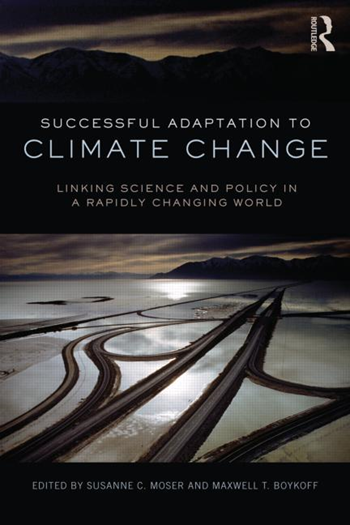Getting rich off global warming – ‘I predict there will be thirty to fifty-thousand climate and adaptation professionals in next decade or so’
(Salon) – On the opening morning of the inaugural National Adaptation Forum, I was eating breakfast at a stand-up table in the exhibition hall when a mustachioed man of middle age plopped his cherry Danish next to my pile of conference literature, a mess of pamphlets and reports with titles like Getting Climate Smart: A Water Preparedness Guide for State Action, and Successful Adaptation: Linking Science and Policy in a Rapidly Changing World. The nametag dangling above the Danish identified the man as Michael Hughes, director of public works for the Chicago suburb of Elmhurst. Like many attendees, Hughes was part of a new national emergency-response team without being fully aware of it. He had arrived in Denver knowing little about “adaptation,” the anemic catchall for attempts to fortify our natural and built environments against the epochal temperature spike in progress. “I hadn’t even heard the term ‘adaptation’ a month ago,” he told me, taking a bite. He didn’t know anything about the 20 federal agencies that just released adaptation planning studies, or the dozen coastal states negotiating the early stages of “managed retreat” and “coastal abandonment,” buzzwords for the work, underway from Puget Sound to Brighton Beach, of accommodating rising seas by contracting the contours of the U.S. map. Hughes didn’t know about any of this. He just knew that the Elmhurst sewage and water systems were buckling under the strains of the new normal, and that his job was figuring out what to do about it. “The floods keep coming, they keep getting worse, and every time there’s damage, everyone blames me,” he said. “I’m here to learn more about what’s happening, and talk to people dealing with the same problems.” For three days in April, the downtown Denver Marriot was Mecca for people like Hughes. More than 500 registrants from the government, NGO, and university research worlds gathered to network and strategize amid a dense schedule of workshops that could double as creative sessions for the next Roland Emmerich cataclysm flick. Overflow crowds squeezed into drab conference rooms for presentations with names like “Cross-Sectoral Urban Adaptation,” “Building Coastal Resilience,” “Wildlife Adaptation and Managed Species Relocation,” and “Seawalls and Wrecking Balls: Operationalizing Coastal and Marine Spatial Planning. ” Over coffee and buffet lunches, the conversations continued minus the jargon. Western agricultural officials in cowboy hats talked water wars and agriculture collapse with environmental program managers from New Jersey, who discussed the zoning politics of coastal retreat with climate justice activists from Los Angeles and Oakland. This was the sound of America’s climate adaptation community coming together at the management level for the first time. The veterans among them were used to working the shadows and margins of politics and policy, struggling to get officials and the public to begin thinking five degrees and 20 inches ahead. “A couple of years ago, I’d get thrown out of meetings for talking about climate change and the need to fund adaptation,” said a Maryland planning official. Super storm Sandy did much to change that, and Denver was a celebration of adaptation’s new momentum. The event also twinkled under rare beams of public recognition and appreciation: At the end of the welcome plenary, cheers erupted when a representative from City Hall announced Denver mayor Michael Hancock’s official proclamation of 2 April 2013 as “Climate Adaptation Awareness Day.” Gestures like this won’t be needed much longer. As the cycle of super storms, floods, and drought deepens and tightens, the immediate need to protect and bend — adaptation — will displace efforts to reduce greenhouse emissions — mitigation — as the center stage of climate politics. An estimated rise of between three to eight degrees Fahrenheit this century will require real-time social reinvention tracked to our accelerating careen out of the stable temperature range of the Holocene Era. This means new ways of thinking and new institutions, the early buds of which could be seen sprouting in exhibition booths lined under the conference slogan, “Action Today for a Better Tomorrow.” At one booth, a friendly rep explained the work of the Oregon-based Geos Institute, the first adaptation think tank. The booth next to his housed the director of a Boulder-based consulting firm called Stratus, a pioneer in developing models for assessing climate-risk for public and private clients. Then there was the booth manned by the glad-handing entrepreneur Daniel Krieger, who last year founded the Association of Climate Change Officers on the models of the American Institute of Architects and the American Dental Association. “I predict there will be thirty to fifty-thousand climate and adaptation professionals in next decade or so, up from the current low single-digit thousands,” said Kreeger. “Already we’re seeing environmental studies and MBA programs integrate climate-related work. The ACCO will set standards and provide services, same as any other professional association.” In October, Kreeger will host a three-day “Climate Strategies Forum” at D.C.’s Wardman Park Hotel. Platinum sponsorships cost $25,000 and include a full-page program ad and a speaking slot. [more]
Getting rich off global warming
